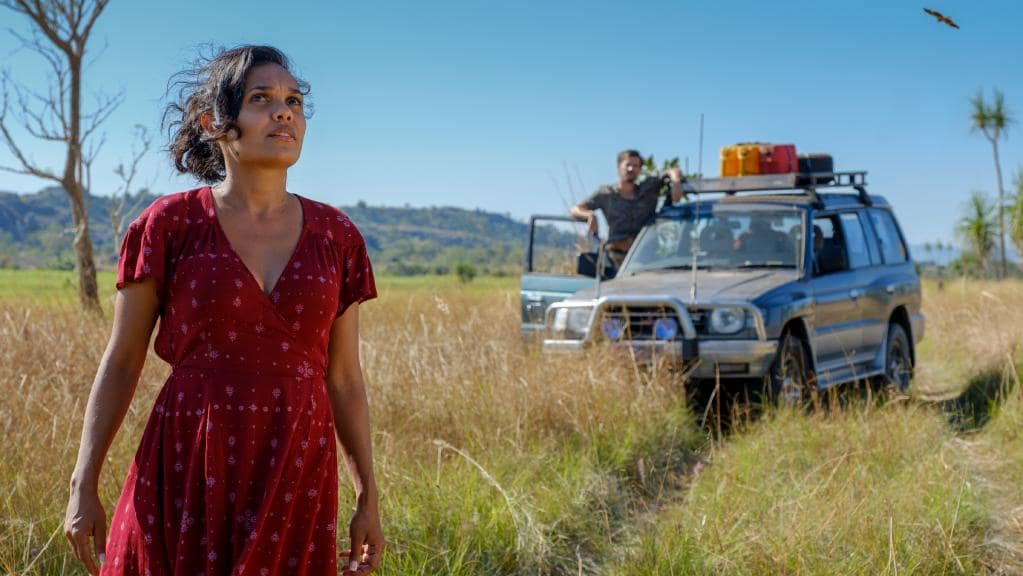By Arnel Duracak

After two unsuccessful – and rather forgetful – features, Wayne Blair returns to a much more personal level of storytelling and filmmaking akin to that of his warm and bubbly The Sapphires (2012). Top End Wedding (2019) is a fine addition to the ‘top end’ romantic comedies of the year – with Long Shot (2019) coming to mind – and by placing Aboriginal and (more specifically) Tiwi culture at the films forefront, Blair is once again able to create a nuanced film that reminds audiences of the importance of home and heritage.
Like The Sapphires, Top End Wedding carries a pulse and personality of its own that can be felt most personally by the people it is representing – Aboriginals. This isn’t to say that there isn’t something to be taken out of the film by everyone but rather, the connection to land and the ties to heritage are tailored towards a specific audience. What made The Sapphires so great was its ability to balance humour with the interraciality of its central relationship and in the process, build a meaningful connection between two very different people whilst never losing the sentiment behind the films narrative. Top End Wedding works in a similar vein however, it feels much more personal and really pushes towards this idea of the journey home and the importance of community. It takes its characters and throws them into unfamiliar territory that serves to remind audiences of just how disconnected we’ve become from our roots and the environment around us. Really, all of the main characters are thrust into a setting and situation that is both daunting and exciting at the same time.
As the title alludes, the film centres around a wedding, but there’s a 10 day window to get it organised and finalized. Miranda Tapsell plays Lauren who convinces her soon-to-be husband Ned (Gwilym Lee) to get married in Darwin where her family would be present and Ned’s family could finally meet hers. There’s one problem though; Lauren’s mother Daffy (Ursula Yovich) has fled off somewhere and it is up to the couple to find her in time for the wedding. What comes from this is a wildish goose chase across the plains of the Northern Territory (ranging from Kakadu to more desolate locations) and from what at first glance appears to be the sort of exhaustive on-the-road trope that just won’t hold up as the chase intensifies. First glances aren’t always the best glances though as what follows is an incredibly entertaining spectacle that blends cheesy Australian humour with the traverse nature of the premise and results in a heart-warming and free flowing adventure. The film doesn’t lose traction as it pushes on from its many short-stops and leaves a tenderness in its wake. Yovich and Tapsell are the films standouts with Tapsell owning each scene with a gleam and maturity that sees her stand tall and separate herself from her witty side character from The Sapphires. Yovich, on the other hand, is the most established and complex character of the bunch as she evokes a poignancy for the consequences of her estrangement from heritage and family through her very timid facial expressions. Lee and Huw Higginson (Trevor) provide a gateway for well timed one liners and the more humorous parts of the film, with Lee further acting as the perfect supporting character to Tapsell.
The theme of disconnection and the importance of the journey and the unknown are what allow Blair to take the film up a notch and give it a heartbeat to match the fun loving nature of the rest of the plot. Blair utilizes the wedding and its subsequent postponing to emphasize just how frightening the whole process can be. At the same time, the journey disconnects its two central leads and casts the wedding into doubt. While this is often a recurring dilemma in rom-coms of the same kind – think Father of the Bride (1991) – and is an overused trope in the genre, it serves to remind its characters that creating a rift or divide between each other won’t serve them any good in the long run – especially considering they love each other. This works hand in hand with Yovich’s plotline and her detachment from her family and eventually, from her husband. While she loves him, she longs for those who she left and for her homeland. In this sense, while her plotline does bring her back to her roots and at the same time, reunites her with her family, it also reminds Ned and Lauren of why they decided to get married in the first place and that they don’t want to lose sight of each other. In this sense, Blair cleverly merges the wedding and the journey to the Tiwi Islands to create a compelling narrative that explores the hardships of distance and detachment whilst also giving the often overused and predictable place of weddings in rom-coms, purpose.
With Top End Wedding, Wayne Blair has managed to create a very gratifying sequel of sorts to The Sapphires and has shown that building a story around one core theme can allow for other – often overused – themes and tropes to retain some dignity and offer some ingenuity. Australian cinema is at its best when offering homegrown directors the platform to tell personal stories, and Top End Wedding reaffirms that whilst also blending the right amount of narrative depth and effective storytelling. Wayne Blair, you have officially redeemed yourself for Dirty Dancing (2017).


